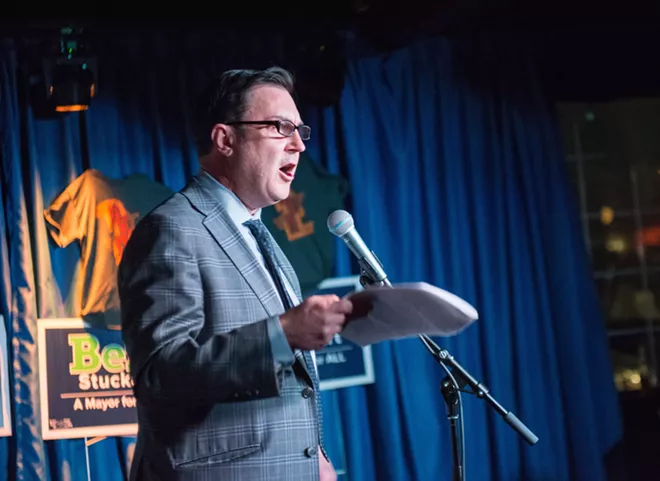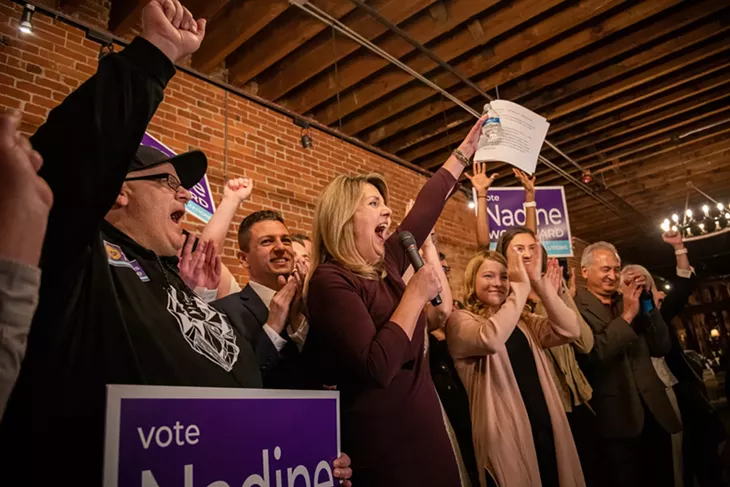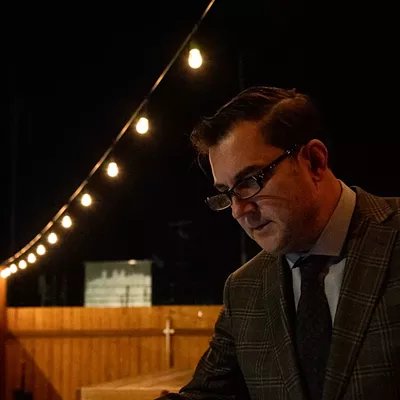City Council President Ben Stuckart put on his reading glasses. He put down his whiskey. He'd been running for Spokane mayor off and on since April of 2016. And earlier in the night on Tuesday, he thought the mayoral race was going to be close — a coin flip either way. It was close. But not so close he could put off reality.
He held his printed-out concession speech in one hand and began to read."Nadine Woodward has won the election to be the mayor of Spokane," Stuckart began to read. And then some in the audience filled with his supporters began to scoff and laugh in reaction. For a moment, it threw him.
"I don't know what the laughter is about," he says. "Elections are hard fought, but they can be loud and angry and expensive. But the citizens of Spokane have had their voices heard."
In one sense, Stuckart came into the race with a huge advantage. He'd had an unbroken string of political wins, turning a council that leaned narrowly to the right to a more liberal 6-1 veto-proof supermajority. Spokane was narrowly a liberal city, and it seemed to be getting bluer all the time. Inside the city limits, Democrat Lisa Brown beat Republican U.S. Rep. Cathy McMorris Rodgers by 17 points in 2018.
Meanwhile, the Spokane economy soared at nearly twice the rate of the national average during Stuckart’s tenure. The city got a rehabbed Riverfront Park, upgraded streets and a new partnership between the library and public schools. Stuckart had fought for the levy that will bring Spokane 20 more police officers, despite the opposition from Mayor David Condon and Woodward. He had the endorsement of the politically powerful fire union. He could argue he had more management experience, more knowledge of City Hall, an expert's understanding of the issues.
But he lost to Woodward, a former KXLY TV anchor, who noted repeatedly that she didn't come from a place of "political experience."
So what happened?
Stuckart spent eight years in the public eye as the head of the City Council, giving himself a chance to establish his record, to highlight his experience and showcase his accomplishments. But that was nothing compared to the head start Woodward had.
She first got a Spokane TV anchor job in 1990. The same year Stuckart graduated from Lewis and Clark High School, Woodward was already an anchor on KREM, burnishing her brand, increasing her name recognition and establishing herself as a member of the community.
For 28 years Woodward got to go on TV nearly every night and talk about community issues. The year before Stuckart ran for council, KXLY paid thousands of dollars to put up 20 billboards with Woodward's face on them. They passed out 50,000 copies of “Hi, I’m Nadine” cards inside Bloomsday runner packets.
Stuckart's political experience gave him a long record of votes — like a mandatory safe and sick leave policy for local businesses — that won him some fans, but infuriated others.
Woodward didn't have to take those votes. Her job meant she didn't often share her views on controversial issues. Instead, her public image could be focused on projecting an image of warmth, authority and trustworthiness.
2. WOODWARD HAD A CLEAR MESSAGE — STUCKART DIDN'T

Stuckart had plans. He had policies. He had specifics. He was frustrated with Woodward's vague collection of talking points.
Woodward's tough-love message on homelessness could fit on a bumper sticker. Maybe something like "Seattle is Dying — Don't Let Spokane be Next." Or maybe "Fix Homelessness, Don't Enable it." Or "Arrests, Not Sandwiches."
But what was Stuckart's message? It was nuanced and complicated, something about densifying Spokane, while protecting the most vulnerable, while expanding economic opportunity.
Liberals compared Woodward's message to the fearmongering reductiveness of President Donald Trump. Stuckart's campaign, however, could be just as easily compared with Hillary Clinton's — a half-defense of the past eight years coupled with a stack of policy proposals. And in politics, clear simplicity beats detailed nuance almost every time.
"I thought last year when I announced, and again when we kicked off the campaign... that this election would be about how we want to grow as a city, but it turned into a referendum on homelessness," Stuckart said during his concession speech.
Woodward harnessed the frustration that plenty of residents, visitors and downtown business owners had about Spokane — that with all the vandalism, crime and homelessness they were seeing, whatever the city was doing wasn’t working.
And each time journalists fact-checked Woodward's statements, assessing crime levels downtown, safety in the downtown library or whether homelessness was driven primarily by drug addiction, they were helping Woodward advance her message of a downtown beset by crime, drugs and homelessness.
Besides, there genuinely was a spike in violent crime downtown last year. Even before the city ended its contract for a 24/7 shelter at House of Charity — eventually leading to last year's "Camp Hope" tent city — the tension between homeless residents and local businesses had become a major issue.
When Stuckart argued that the data showed the issues weren't as bad as Woodward was portraying them, it just opened him up to Woodward's counter that he was taking a "nothing to see here, move along" approach.
Each homeless camp that voters saw, each crime spree they read about downtown, each act of vandalism effectively became an advertisement for Woodward's campaign. Sure, most major successful cities were struggling with the same challenges with homelessness that Spokane faced. But that played into Woodward's favor.
There were plenty of people out there who heard about syringes in parks in Portland and feces on the streets of San Francisco and watched homeless people trapped in a cycle of addiction in videos like KOMO’s “Seattle is Dying” documentary. They agreed with Woodward that they never wanted to see Spokane go in that direction.
Even former City Councilman Mike Allen, a conservative-leaning moderate who endorsed Stuckart, had a lot of sympathy for some of Woodward’s core arguments and irritation with those who would dismiss it.
"It makes me a little bit angry when dealing with some of the folks on the left, is that when you say ‘we have a problem,' they want to dismiss you with ‘You don’t like the homeless and you don’t like the poor,'” Allen said.
4. WOODWARD MANAGED TO RUN BOTH FOR AND AGAINST THE PAST EIGHT YEARS
On Monday night, the day before the election, Mayor Condon's voice went out in a robocall on behalf of the Spokane Good Government Alliance PAC, warning them to not let Spokane be turned into "another Seattle."
"Let's not let the next administration reverse the great things we've accomplished," Condon said.
At her victory party on Tuesday night, Woodward made nearly the opposite argument.
"I think people wanted a change," Woodward said. "A change from the status quo. And they were willing to elect somebody with absolutely no political experience to bring that change about."
For those who love the way things are in Spokane, Woodward capitalized on the concern it could change. And for those were angry at the status quo, Woodward promised she would change it.
Woodward ran an anti-incumbent campaign with the support of the incumbent mayor: With the things that Woodward liked about the last eight years, like the years of balanced budgets, she gave full credit to Condon. But when it came to things she didn't like, like Stuckart and Condon's pursuit of purchasing a new 24/7 shelter, she heaped all the blame onto the City Council. The council members were the ones, she argued, who were enabling the homeless.
And on the issues where Condon and the City Council fought? That was just evidence of Stuckart's inability to work with other people.
"Grow up," Woodward told KHQ early in the campaign. "We have to get along. We have to do what's best for our city, not what's best for what we think we want to do."
5. WOODWARD ESCHEWED PARTISAN LABELS
To anyone who examined her statements, Woodward was clearly conservative — possibly even more so than Condon. But Woodward intentionally avoided the Republican label, pointing out that could hurt her in Spokane. While the local Republican Party endorsed Cindy Wendle, they refused to endorse Woodward.
But after she won? The Republican National Committee sent out a newsletter touting that "conservative Mayoral candidate Nadine Woodward defeated Ben Stuckart in a shocking Victory in the liberal stronghold of Spokane, Washington."
Paul Dillon, a former Inlander contributor and a member of the pro-Stuckart Citizens for Liberty and Labor PAC, says a lot of voters were not aware of where either candidate stood ideologically.
"When I talked to a lot of people, they were still asking 'Is Ben a Republican or a Democrat?" says Dillon. "There’s so many people that don’t know in a nonpartisan race."
Dillon argues that local liberals brought more energy during last year's mid-term elections — rallied by their outrage at Trump — despite the much more unlikely possibility of defeating Rep. Cathy McMorris Rodgers.
Spokane County Treasurer Michael Baumgartner, the husband of Woodward's first campaign manager, says he wonders whether some of the liberal candidates' "recent success on those council elections gave them a false sense of what a real campaign is actually like."
He says he wondered why they didn't work harder to tie Woodward to candidates who did poorly in Spokane — like Donald Trump and McMorris Rodgers.
“If it had been a partisan election, it would be interesting to see how it would have turned out," Baumgartner says.
6. LIBERALS FAILED TO CAMPAIGN ENOUGH IN NORTHEAST SPOKANE
"It seems like a lot of progressives completely discarded the northeast in this election," Dillon says.
Councilman-elect Michael Cathcart saw the same issue.
"The first evidence of any doorbelling [from Stuckart] was literally three days before the primary," Cathcart says.
As a result, two conservatives — Cathcart and Tim Benn — got through the primary. That meant two conservative council candidates were going door to door, criticizing Stuckart and the current makeup of the City Council, without being countered by a council candidate in the northeast. As Councilwoman Kate Burke, arguably the left-most member of the council, has shown, liberals can win in northeast Spokane. But they have to campaign hard and with the right message.
7. STUCKART HAD THE REPUTATION OF BEING A JERK
"I had a reputation of being a bully," Stuckart said in an interview Tuesday night. Woodward had clashed with former colleagues behind closed doors, but many of Stuckart's clashes with council members and members of the public happened live and on video.
Even with his allies, Stuckart could sometimes be prickly, terse and combative. He'd apologize. He'd try to mend relationships. But constituents had their own bad-experience-with-Ben-Stuckart stories. And they told their friends.
8. STUCKART HANDCUFFED HIMSELF DURING THE DEBATES
Debates should have been Stuckart's bread and butter. At Gonzaga University, Stuckart was a nationally competitive college debater. But during this campaign Stuckart rarely if ever matched the table-pounding rapid-fire passion that he showcased during marathon council meetings. He says he had to hold himself back, restraining himself, because he didn't want to feed the narrative that he was a bully.
“On camera they’re calling me names, but because of a reputation I had, I couldn’t be myself — which is a debater — and really snip back,” Stuckart says. “It was a very hard thing for me to be so restrained.”
Instead, he often sounded more like Condon — going into granular detail about ordinances, statistics, city procedure and funding mechanisms, while Woodward repeatedly hit what she saw as problems with the status quo. He came across as visibly irritated, as someone holding himself back, not able to truly be himself.
9. WOODWARD PROMISED MORE FOR LESS
Woodward voted against Stuckart's levy that paid for more police officers, but celebrated the additional police officers. She claimed the officers could have been added without raising taxes, though never quite detailed how. She promised to add even more if she were elected.
Woodward argued the city could spend less on low-barrier 24/7 shelter services and simultaneously reduce homelessness. She said there was fat in the budget, but didn't specify where. She promised raising taxes would be a last resort.
Woodward presented voters with the prospect of major benefits without the costs.

In April of 2018, Stuckart stood in the unfinished lobby of the McKinley School to make the announcement he was re-entering the mayoral race. Developer Rob Brewster was going to convert the schoolhouse into a mixed-use facility, including a brewery. The site, he argued, was symbolic.
“There’s some rough, rough edges right now,” he said, just like Spokane. But just imagine the potential, he argued. He was running as an urbanist, he explained. He was pro-growth, pro-density, pro-development. He lamented the left's "knee-jerk reaction that developers are bad." He bragged about the support of local developers like Ron Wells, Larry Stone and Rob Brewster.
But a year and a half later, work on Brewster's property hadn't yet begun, and Brewster was blaming the city. Until the Spokesman-Review alerted Brewster, taxes hadn't been paid on the property in four years. Ron Wells ended up pleading guilty to insurance fraud.
And Larry Stone? He spent $100,000 to fund a video called "Curing Spokane" that echoed much of Woodward's campaign rhetoric about issues like homelessness, drug addiction and a downtown in disarray. Stone pulled his endorsement of Stuckart. And then Stuckart flirted with trying to undo the incentives the city planned to give to Stone's development project, feeding the narrative that Stuckart was impulsive and retaliatory.
11. STUCKART WAS CRUSHED BY INDEPENDENT SPENDING
When Condon ran against Mayor Mary Verner in 2011, it was considered a big money race, with everyone talking about the huge influence of the $63,000 the state GOP dumped into the Condon campaign coffers.
In 2017, Stuckart passed a city campaign finance ordinance that prevented the GOP — or anyone else — from donating that much directly to a candidate. But while his law came with new transparency requirements for independent groups to reveal their top donors, the Citizen United Supreme Court decision left him powerless to do anything about independent expenditures from outside groups.
Ultimately, Stuckart’s campaign finance initiative was like a kid’s little sandcastle wall crushed by a tidal wave of independent spending. Independent PACs racked up more than $415,000 in independent spending to try to elect Woodward. They didn't just send out ads either — they reportedly paid canvassers to go door to door, to personally lobby for candidates like Woodward, Wendle and Cathcart.
The Washington Association of Realtors alone spent nearly $265,000 in independent expenditures through its political action committee in favor of Woodward.
Independent PACs offer another advantage to the candidates they supported. Since they couldn't coordinate with the candidates, it allowed them to send out attacks, while the candidate had plausible deniability.
Stuckart had supportive PACs too, like the fire-union-bolstered Citizens for Liberty and Labor. But the nearly $235,000 spent by PACs on behalf of Stuckart still paled in comparison to the pro-Woodward war chest. The pro-Stuckart PACs only started spending late into the race, and much of the advertising was focused on attacking Woodward for being supported by PACs funded by developers and realtors — simply driving home how much support she had among people who built and sold housing.
Stuckart had spent much of his career lamenting the powerful influence of money in politics. He sees his final race as effectively one more piece of evidence in that case.
“I’m just going to say that we spent over $1.2 million on this race, and money is the root of all problems in politics,” Stuckart said during his concession speech.
S
tuckart, however, doesn't look at his race as a procession of mistakes or missed opportunities. He says he wouldn't have changed a thing.At the end of his brief concession speech, Stuckart shared a story that he hasn’t shared at all during this race, about a homeless man he knew for decades named John Hummel — a guy who donated to Stuckart’s first race. John was charismatic and intelligent, but he was also an alcoholic. He refused to go to rehab. The money he got was squandered.
But this wasn’t one of those stories about how one program or another got him out of homelessness and now he’s a successful New York businessman. It’s a story that ends with John dying in 2018 at the House of Charity. It’s the sort of sad story that politicians might use to say that shelters like House of Charity have failed, that we needed to do more to force people into treatment.
But to Stuckart, the lesson was the opposite. Catholic Charities couldn't save John — but they could care for him.
“John was incredibly intelligent, but died homeless. John was complicated just like each and every one of us. John had human dignity,” Stuckart said. “I want to say that while I am sad I couldn’t fix John’s situation, I am forever grateful that Catholic Charities exists with no judgment, and he was able to stay at their facility on and off throughout and at the end of his life.”
And then Stuckart, as the audience began to applaud, delivered what might be the summation — and the epitaph — to his political career.
“We cannot fix everyone but we can damn well better try,” Stuckart said, “and at the very least we damn well better provide for every member of our community’s basic needs."

































